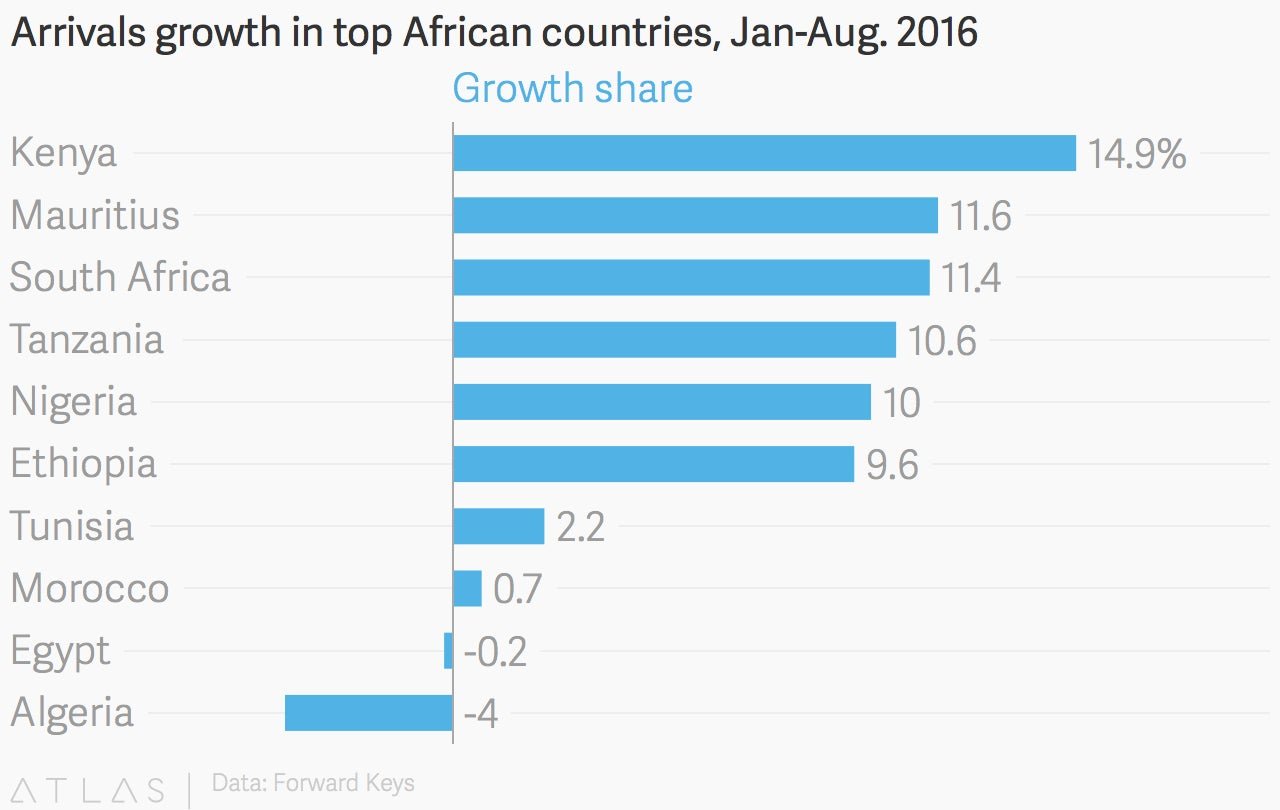SA hackers vs malaria, hobbling leapfrogs, East Africa is flying
Hi, Quartz Africa readers!

Hi, Quartz Africa readers!
[insertSponsor]
Rational behavior
Many big multilateral conferences of world leaders have a catchphrase or idea that helps sum up how everyone’s feeling at the present moment and at this week’s US-Africa Business Forum that idea was diversification.
It’s not a new concept for discussions of Africa’s business and trade development but it has new-found resonance this year. The last time president Barack Obama and former mayor Michael Bloomberg welcomed African leaders to New York for the inaugural summit in 2014, the world was a very different place. It was near the peak of the global energy and commodity boom. Skyrocketing oil prices for example—which drove some of Africa’s largest economies—are today below half of what they were back then.
Many leaders are focused on the need to pull away from the boom and bust cycle of commodity-driven economies common across the continent. The optimism and hope that came with the ‘Africa rising’ narrative of the boom years probably explains why the pessimism that comes with the downturn this time is particularly sharp.
Still, there was a strong sense as presidents and business leaders spoke at the Plaza Hotel, that they now believe diversification is vital. Speeches by Nigeria’s president Buhari and Côte d’Ivoire’s president Ouattara in particular listed various sectors their economies could develop away from the main commodities or resources they’re known for.
“Diversify, diversify, diversify,” was the mantra for Africa Development Bank president Akinwumi Adesina in an interview with Quartz during the week. “It’s a critical issue,” he says. But as Adesina also notes, it’s not simply about moving from Commodity X to Commodity X and Y, it’s also about moving up the supply chain and adding value to existing commodities or industrialization around extracted minerals.
There’s a quiet feeling growing that this commodity downturn could be a real opportunity for African governments and private sectors to make significant progress in breaking the rent-seeking, commodity-driven economic cycle before the next boom.
There are no guarantees, but as Amy Jadesimi, chief executive of Ladol, a Nigerian oil & gas services company put it: “It’s an opportunity for rational behavior.”
Yinka Adegoke, Quartz Africa editor
Five stories from this week
Using data to fight diseases in Africa. Scientists are stepping out from behind the microscope to work on a hackathon to crack the code behind various diseases. The Johannesburg-based team are using data and other tools to take on a drug-resistant strain of malaria, tuberculosis and track the spread of cancer, writes Lynsey Chutel.
Somalia’s fragile democracy is starting to take hold.
Starting this weekend, only 14,000 delegates representing Somali clans will choose the next parliament who in turn will vote for the next president. Despite this narrow model of electioneering.
the system has had a moderating effect on the country’s dismal political reality since the civil war largely ended in 2011.
Can Nigeria’s new mobile taxes fix its cash crunch. With falling oil export revenue, Nigeria has been forced to look elsewhere for income. Lawmakers are debating a controversial communications service tax bill which will charge service providers a new tax on phone calls, texts, internet data and pay TV, explains Yomi Kazeem.
Africa is hobbling its ‘leapfrogs’. Harvard’s Calestous Juma argues many African countries are allowing local regulators to get in the way of the kind of innovation and innovators the continent needs to progress. He says regulations should be informed by practical experience instead of relying on conventional assumptions.
Only seven people speak this Kenyan language. The Yaaku people, of Kenya’s Rift Valley, number only around 4,000 and only seven people, can speak the ethnic group’s native language, Yakunte, fluently, writes Lily Kuo.
Chart of the Week
Travel to North Africa is down this year. Data from flight reservations show that bookings to countries in east Africa have grown even as visits to the continent’s north have declined. In contrast, fears over terrorist activities have dampened the number of visitors to northern countries like Egypt, Morocco and Tunisia.

Other things we liked
Egypt’s Nubian community at a crossroads.
For thousands of years, the Nubian people have lived on the banks of the Nile river, from southern Egypt to northern Sudan. But when Sudan seceded from Egypt in 1956, the Nubian community was split between the two countries.
have since then lost their rich history and language, and have faced political, social and economic marginalization.
What does it mean to be a Comorian? Depends on where you live.
In 2008, the United Arab Emirates agreed to give the Comoros Islands $200 million in return for passports for 260,000 stateless residents. As
for MTV News, the issue is more complex than just getting a passport, and has everything to do with immigration policies and government who are trying to draw a line between citizen and noncitizen.
Keep an eye on
Women in Tech Africa Week (Sept. 26–30). The annual Women in Tech Africa conference will simultaneously take place in 40 countries and attract over 40,000 participants. The week-long event is aimed at creating a platform for women globally to come together to network, empower each other, share resources and push forward the technology growth agenda.
Our best wishes for a productive week ahead. Please send any news, comments, dead language translators and no new taxes to [email protected]. You can follow us on twitter at @qzafrica for updates throughout the day.